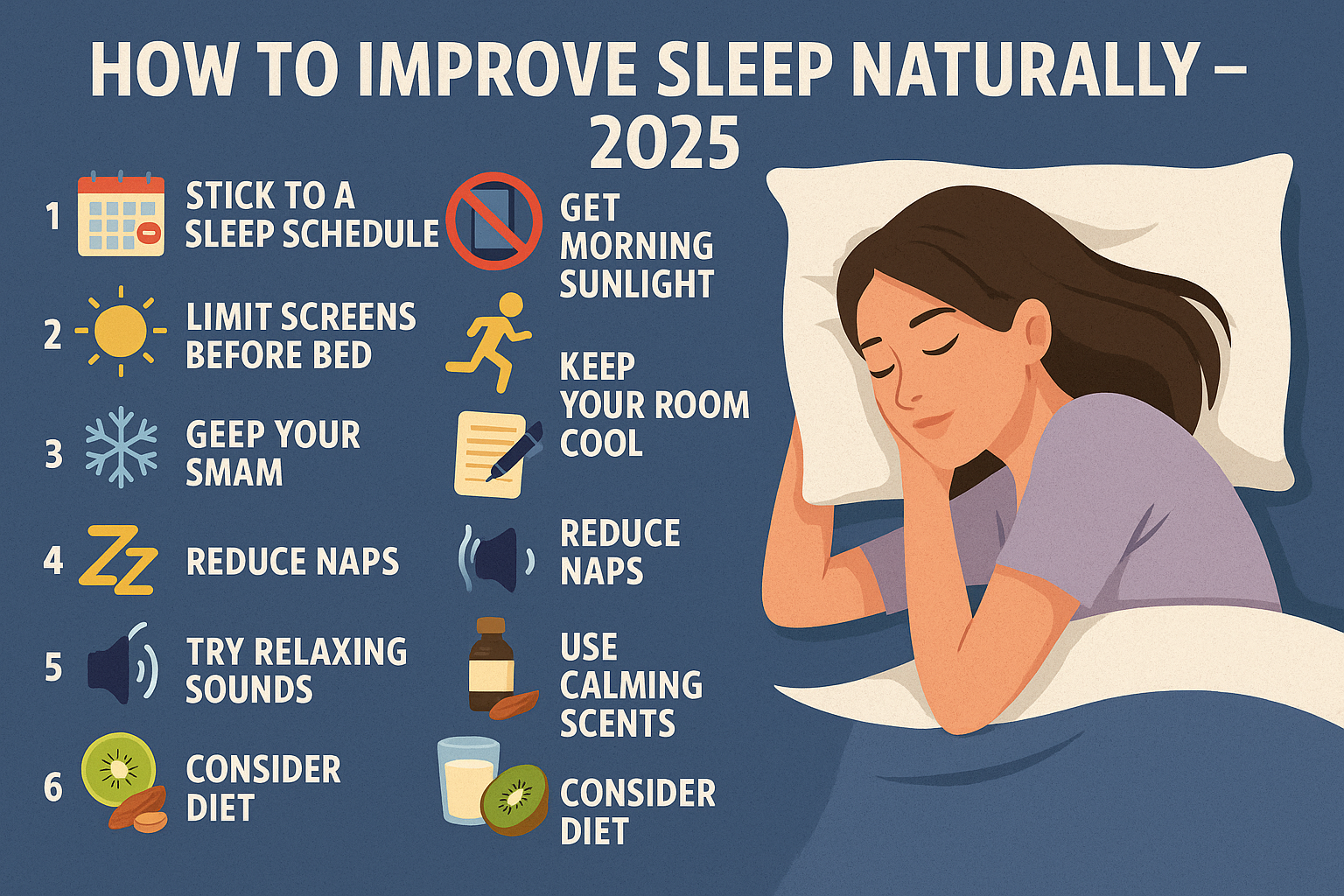How to Improve Sleep Naturally Without Medication
Meta Description:
Tired of tossing and turning? Discover natural, science-backed ways to improve your sleep in 2025—without relying on pills. Better sleep, better health, no side effects.
1. Why Sleep Quality Matters in 2025
In a world full of screens, stress, and noise, sleep is one of the first things to suffer. Poor sleep is linked to:
-
Weak immunity
-
Brain fog
-
Weight gain
-
Mood swings
-
Higher risk of chronic diseases
🌙 In 2025, natural sleep strategies are more important than ever—especially for those avoiding sleep aids or medications.
2. Common Causes of Poor Sleep
🛏️ If you're struggling to fall or stay asleep, it could be due to:
-
Blue light from screens
-
Caffeine too late in the day
-
Stress or anxiety
-
Lack of physical activity
-
Irregular sleep schedule
-
Late-night eating
-
Noisy or uncomfortable environment
💡 Good news: most of these can be fixed naturally.
3. 10 Natural Ways to Improve Sleep
🧘 Try these research-backed sleep hacks:
-
Stick to a sleep schedule (same bedtime and wake-up time daily)
- Avoid screens 1–2 hours before bed
- Get sunlight exposure in the morning to set your circadian rhythm
- Exercise regularly, but not right before bedtime
- Use blackout curtains or a sleep mask
- Cool down the bedroom (ideal temp: 60–67°F or 16–19°C)
- Write in a gratitude journal to ease nighttime worry
- Limit naps to under 30 minutes
- Try natural sleep sounds like rain or white noise
- Use calming scents like lavender or chamomile essential oil
4. Foods That Help You Sleep Better
Yes, what you eat affects how well you rest.
✅ Best foods for sleep:
-
Kiwi 🍽️ (high in serotonin)
-
Almonds & walnuts 🥜 (magnesium + melatonin)
-
Tart cherry juice 🍒 (natural melatonin)
-
Oatmeal 🌾 (tryptophan-rich)
-
Herbal teas ☕ (like chamomile or lemon balm)
🚫 Avoid: caffeine, alcohol, spicy foods, heavy meals close to bedtime.
5. Lifestyle Changes for Deep Rest
💤 It’s not just about bedtime—your whole day affects your night.
-
🧠 Reduce stress: Meditate, do yoga, or take tech breaks
-
🏃 Move your body: Physical activity helps regulate hormones
-
🌅 Wake up with light: Use sunrise alarms if it’s dark in the morning
-
📱 Set screen limits: Use apps like “Digital Wellbeing” or “Focus Mode”
-
📖 Create a calming routine: Reading, breathing exercises, or light stretching
🕯️ Bonus: A warm bath 1 hour before bed can help lower your core body temperature.
6. When to Seek Professional Help
If you’ve tried the natural route and still struggle with sleep:
🩺 See a healthcare provider if:
-
You snore heavily or gasp in sleep (possible sleep apnea)
-
You wake up tired after 8+ hours
-
You feel depressed, anxious, or wired at night
-
Your insomnia has lasted more than 3 months
They may recommend a sleep study, CBT-I (cognitive behavioral therapy for insomnia), or nutritional testing.
7. Final Thoughts
Improving sleep doesn’t require sleeping pills—it takes awareness, habit change, and a little patience. With these natural tips, you’ll be on your way to better sleep and better health in 2025.
🧠 Recap:
-
Build a consistent sleep schedule
-
Use light, sound, and temperature to your advantage
-
Eat and move mindfully
-
Calm your mind at night
-
Let your sleep environment do the work
💬 FAQs
Q1: How many hours of sleep do adults need in 2025?
A1: 7–9 hours per night is ideal for most healthy adults.
Q2: Is melatonin safe to take regularly?
A2: It’s safe short-term, but should not replace healthy habits long-term.
Q3: What’s the best bedtime in 2025?
A3: Between 10 p.m. and midnight is optimal, aligned with your natural melatonin cycle.
Q4: Can poor sleep affect my skin and weight?
A4: Yes! Sleep regulates hormones that affect metabolism, hunger, and skin repair.
Q5: Should I turn off Wi-Fi or phones at night?
A5: Yes. Limiting EMF and light exposure improves sleep quality for some people.

